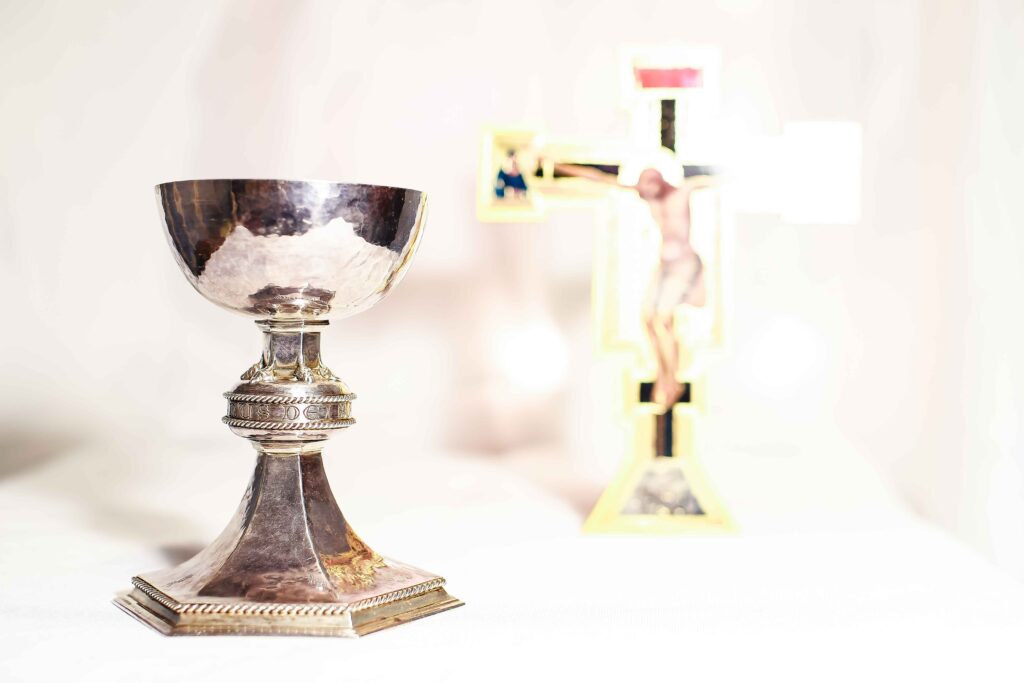Speaking Of Life 3018 | Coronation of Thorns
The crown of thorns is one of the most known symbols in Christianity. The crown was given by the soldiers to mock and humiliate Jesus. Death thought he won but Jesus can turn darkness into light, mourning into dancing, evil into good, and a crown of thorns into a crown of victory.
Speaking Of Life 3018 | Coronation of Thorns
Greg Williams
The crown of thorns is perhaps the best-known image in the Christian tradition other than the cross itself. Jewelry, church decorations, and art imagery all carry the familiar image of the barbed circle that was on Jesus’ head as he was paraded through Jerusalem and then nailed to a cross.
It’s so common, we sometimes don’t think about it. But just this one detail of description teaches us a bit more about Jesus.
The first time we see thorns in scripture is in the tragic declaration of the curse after Adam and Eve brought sin into the world:
Cursed is the ground because of you; through painful toil you will eat food from it all the days of your life.
It will produce thorns and thistles for you, and you will eat the plants of the field.
Genesis 3:17-18 (ESV)
It’s clear that thorns were part of the curse. Continuing throughout the Old Testament, we see thorns and thistles often representing sin and the people forsaking God.
“Thorns will be in their tents,” says Hosea. “They have sown wheat and have reaped thorns,” Jeremiah proclaims. Isaiah declares, “briars and thorns will come up.”
In contrast to this, when God is present and the people walk with him, streams appear in the desert and the promises always involve growth, flowers, and abundance.
But back to Jesus. Back to the soldiers putting a purple robe on him and giving him a grisly coronation of thorns. It is just prior to his death that Jesus is lifted up under the sign of king.
This is his enthronement. The very moment of his humiliating death was his victory, and the Kingdom was declared as he screamed his last. He took our pain and loss and sin into himself, and in death, the crowning result of sin was undone.
The thorns, the enduring symbol of the desolation of sin, became instead the crown of Jesus the king.
He turned shame into glory. Then he told us to live every day in this upside-down kingdom, where the last shall be first, the weak are the strong and the thorns become crowns.
What does it mean to live in that existence, not only as a far-off promise of a blissful afterlife but of the transforming reality of the world that he has overcome? It is a freedom to live life in his fullness, to participate in his victory, to look at the crown of thorns as a reminder that Jesus is King.
I am Greg Williams, Speaking of Life.
Psalm 31:9-16 • Isaiah 50:4-9 • Philippians 2:5-11 • Mark 14:1-15:47
The theme for this week is emptying ourselves and filling with trust. Our call to worship Psalm is the lament of someone whose soul is “wasting away,” but chooses to put his hope in the God who can be trusted. Isaiah 50 is the cry of the prophet who speaks his message despite opposition and trusts God to care for him. Philippians 2 describes Jesus’ self-emptying of his status and right as the Son to humble himself out of obedience to the Father. Our sermon discusses Mark 14-15, the story of Jesus emptying himself to death on a cross, prefigured by the woman who emptied the perfume in his anointing.
A Senseless Act of Beauty
Mark 14-15 ESV
Let’s start with a story. Skilled author and memoirist Ian Morgan Cron described his interactions with a professor he idolized in school. This pipe-smoking, Scotch-soaked academic had written some award-winning fiction during his career, and he took Ian and a few other lucky students out to see his writing cabin behind his New England home. All his great works had been written there.
Ian describes the scene:
…a chair, a plain table with an ancient typewriter on it, a thesaurus, a picture of his dog Jack, and a decanter filled with an amber liquid. A short stack of firewood sat next to the black stove. He had worked in that cabin for fifty years.
The students stood there in awe, trying to catch a glimpse of the keys this great literature was typed on. At one point, an ambitious and clueless student loudly asked a question and broke the sacred moment.
The professor, in a cloud of pipe smoke, strode over to the student and said, with dreadful calm: “Sometimes it’s wiser to reverence than to parse.”

I
Ian goes on to talk about the faith he discovered in his early twenties. He describes his frustration with the heady, bookish types that were always trying to argue the case for faith—to “parse” God into logic tables and airtight syllogisms.
…it was thin gruel to me. I didn’t want to parse God—I wanted to be swept up in his glory. I didn’t want to understand the Holy One; I wanted to be consumed in his oceanic love.
Like the professor who told them not to comment, but just to stand in the sacred moment, Ian described his growing love for God as something beyond words. We can all think of these moments—seeing a great spectacle of nature, meeting the love of our life, seeing our child born—around which any words sound like distracting noise. Any commentary we might blurt out at such a moment seems to tarnish it—a distraction from the unspeakable holiness of what’s happening.
And while he was at Bethany in the house of Simon the leper, as he was reclining at table, a woman came with an alabaster flask of ointment of pure nard, very costly, and she broke the flask and poured it over his head. (Mark 14:3 ESV)
Our reading today gives us such a moment. This woman, without a word that we have recorded, and basically out of thin air, appears and anoints Jesus. The perfume fills the room, so strong it stings their eyes, and there are no words for that moment.
We are coming up toward Jesus’ crucifixion and death—called his “Passion” in many church traditions. Most of the Gospels describe the life of Jesus in the first two-thirds or so of the writing, and then spend the entire last third on the last week of his earthly life. They grind down to a crawl for the last moments, and not a word is out of place.
Mark sets this story in what some commentators call a “Markan sandwich.” Two stories are set to either side of another story so that the three of them comment on each other. On one side of this story we have the plot to kill Jesus forming. The Pharisees and other leaders discuss what might be the best moment to do away with this challenging Messiah figure. On the other side of the story, Judas goes to the halls of power to strike his infamous deal to betray Jesus.
So on either side of this woman’s emotional, intuitive, gorgeous moment, we have the calculating machinations of those trying to keep power and or gain power. We have men, the only gender taken seriously at that time in history, entirely missing the point of what is going on. In the middle of it all comes this unnamed woman who performs this act of beauty—the only fitting response to Jesus.
All the Gospels contain a version of this story, some of them with more description of the woman. We don’t know if this happened more than once or if the Gospel writers saw the story differently. But let’s zero in on the way Mark tells it.
Jesus had an amazing ability to stop everything when something mattered the most—to call the loud music of the story to an absolute halt in a moment. He spins around and says, “Who touched me?” when the woman touches the hem of his garment. He accepts the absurd offering of a simple lunch from a boy, which he then multiplies to feed thousands. He stops everything to let children crawl all over him even though the public is waiting.
Here he stops as this mysterious woman comes out of nowhere to dump a year’s worth of wages on his head.
Are we willing we stop like that? Do we know how to stop and listen in the helter-skelter of the day to listen to a child tell a pointless story? To be present with an elderly person who has trouble hearing? To ask our spouse about their day before immediately talking about our own? These are small things; they are sacred things.
…and she broke the flask and poured it over his head. (Mark 14:3 ESV)
She broke the flask itself, meaning it would be used all in that moment. There wasn’t going to be anything left, just the oil and the smell hanging in the air for that moment until the wind blew it away.
Have you ever tried to re-cork a bottle of champagne? If you can even find the cork after it flies through the room, it’s expanded so much that it can’t fit back into the bottle. And that’s the idea. Champagne, expensive $300 a bottle champagne, is meant to be consumed entirely when it’s opened. You want to be sure the occasion calls for it, because there’s no going back.
Forgive me if I jump ahead a few verses to Jesus’ response to the situation.
She has done a beautiful thing to me. (Mark 14:6 ESV)
Even this phrase sticks out like the exchange itself. A beautiful thing. Beauty is one of those anomalies in life—we can all recognize it, we all have a certain thirst for it, and yet it serves no “purpose.” Beauty doesn’t get us prey or defend us from predators, it serves no advantage. Yet it’s part of being human, and a part that those who don’t believe in God can never quite explain away.
Beauty is this moment that breaks this context, that skips the needle out of the groove and kicks the story off its rails. Out of nowhere, there’s this woman; out of nowhere, there’s this sudden extravagance.
Do we worship like this? Do we pour out all we have before Jesus—our hearts and souls? Even when it might make other people, even ourselves, uncomfortable?
C.S. Lewis, in “Letters to an American Lady,” writes:
The precious alabaster box which one must break over the Holy Feet is one’s heart. Easier said than done. And the contents become perfume only when it is broken. While they are safe inside they are more like sewage.
And that is the story here. While Judas is guarding whatever agenda he had, and lining his pockets, his soul is being lost. While the leaders plot and scheme to keep their power, their souls go bad. Only this woman, unnamed and almost irrational, gets it. And the perfume only becomes perfume when it’s outside of the bottle it came in.
The disciples are also on an adventure in missing the point:
There were some who said to themselves indignantly, “Why was the ointment wasted like that? For this ointment could have been sold for more than three hundred denarii and given to the poor.” And they scolded her. (Mark 14:4-5 ESV)
They are just coming up on Passover, which was a central festival to the Jewish faith. During that time, giving to the poor would have increased—it was the thing to do at Passover.
This also seems like they are starting to understand—or at least think they understand—what Jesus was about. He served the poor, and he called them to always remember the poor. They are stepping in to say they get what Jesus is up to, and this is how he’d want it. They even go so far as to give the exact amount—300 denarii, which is roughly a year’s wages.
And here is where they miss the point.
But Jesus said, “Leave her alone. Why do you trouble her? She has done a beautiful thing to me. For you always have the poor with you, and whenever you want, you can do good for them. But you will not always have me. She has done what she could; she has anointed my body beforehand for burial.” (Mark 14:6-8 ESV)
Yes, serving the poor is vital to what it means to bring in the kingdom. We hold up the broken, we speak for those who are voiceless, we work hard to see equality and justice in the world. But that’s not the entire picture.
In that context as well, the prophets and sages would have called them back to obedience. To serve the poor and bring God’s love to the broken, isn’t that what Jesus wants done?
Again, that’s not the entire picture. That’s a much more palatable picture, especially in our modern scientific times. Jesus as the great moral exemplar, the social reformer—note all these strange thorny questions of him dying and rising, of him being somehow God and somehow human at the same time.
And Jesus’ answer doesn’t let them—or us—go in that direction. Yes, the kingdom is all about changing society and healing the broken, but we can’t separate that from Jesus, the son of God and son of a woman, the King of the universe. The disciples jumping to talk about the “practical” uses for that money is a bit like the freshman jumping at the professor to ask his question—“sometimes it’s wiser to reverence than to parse.”
The moment is sacred. The story is beautiful and strange and beyond our tiny words and tiny minds to wrap itself around. Do you describe a summer night studded with stars by bringing out a graph and calculator? Do you stop the London symphony so you can whistle a tune? Do you doodle on the ceiling of the Sistine chapel? Never!
All you can do in those moments is wonder. And that’s what this unnamed woman gets in this moment. She didn’t have a theology degree; she didn’t understand all the ins and outs of what Jesus was up to. She just knew she needed to abandon herself in that moment and let her heart pour out in front of him.
…she has anointed my body beforehand for burial. (Mark 14:8 ESV)
Such a beautiful connection! Maybe she and Jesus both made sense of this at the same moment. This moment fit into the story somehow, but it’s not fully articulated until right then. She anoints Jesus’s body, but he’s not dead yet. For one, he will die as a tortured criminal and there won’t be the time and space to anoint him. But the other reality is that his body simply won’t be there when the ladies come to anoint him later on.
And truly, I say to you, wherever the gospel is proclaimed in the whole world, what she has done will be told in memory of her. (Mark 14:9 ESV)
And the story closes. The unnamed woman will have her story told over and over when the gospel is preached. And that has come true, of course. A character without even a name, at least in Mark’s telling, is always mentioned as part of the story.
Because she stopped everything for a moment. She brought everyone out of the worry, suspicion, anxiety of the moment to see the larger picture, even unknowingly. Jesus isn’t just a social reformer or another prophet to scold Israel. Rather, he’s the ultimate end of all of this, the grand conclusion of the human story itself. And the only proper reaction to that is wordless, nameless worship.
So what do we take home from this nameless lady with the oily shards around her feet, surrounded by a roomful of confused people? It’s risky and tarnishing to do too much commentary, but we can take home a few ideas.
- Abandoned – She has a great abandon in her worship. She lets herself go and “has done what she could” (verse 8). Do we have abandon in the way we worship and in the way we follow Christ? Do we break the jar and pour it all out to him—our worries, needs, dreams, joys and pain? He wants it all. What are we holding back?
- Beauty – See the beauty in this “unnecessary” moment, as the disciples call it, this “waste.” Can we see the multi-valent, multi-dimensional beauty of life that Jesus wants us to see? Only in him can we truly hold life with an open hand to let its beauty bloom.
- The poor you will always have with you, you will not always have me – Yes, Jesus was a great reformer of society, a prophet, a great high priest, a great friend and a dynamic leader, but he was something more. Let’s not forget that in our modern efforts to make the gospel therapeutic or inspirational or comforting. It is all those things, but it is also the utterly strange and wild story of God coming to earth in the guise of a first-century peasant who spoke with an accent and died like a criminal. He then came back in the even stranger story of a resurrected body that appeared and disappeared between worlds, and he reversed death itself. It is indeed, a strange and beautiful story, and it’s the only one that works.
So, this Sunday is also Liturgy of the Passion Sunday. It’s often accompanied by the longer reading from Mark of some of the last parts of Jesus’s life. Let’s read that passage now, Mark 14:1—15:47, without commentary or response. But simply read it and listen in sacred silence to this amazing story that makes all other stories make sense. Let’s hold this beautiful moment together.
Read the passage with your congregation or have chosen readers. Close simply with “Amen” or a closing song.
Questions for Speaking of Life: “A Coronation of Thorns”
- Have you ever owned a piece of jewelry or art depicting the crown of thorns? What does the image bring up for you?
- We talked about thorns as a theme in the Bible starting with the curse of Adam. Does that heighten the irony of Jesus wearing a crown of thorns?
- Have you seen God reverse curses in your own life? Turn what you thought was loss and desolation into glory?
Questions for Sermon: “A Senseless Act of Beauty: Luke 14”
- The sermon focused on the wordless act of the woman anointing Jesus. Have you ever been present at a moment that can’t be put into words? As if any commentary would tarnish that moment and doesn’t even come close?
- What do you think of verse 7? Jesus drew a kind of distinction between serving the poor and serving him. Did he mean we should forget about the poor?
- Is it difficult, like this woman, to pour out our hearts in worship? Why? Why do we hold back?
Quote to ponder:
“The strong hands of God twisted the crown of thorns into a crown of glory; and in such hands we are safe.” ~~Charles Williams, author and theologian



 By Cara Garrity, Development Coordinator
By Cara Garrity, Development Coordinator
 By Randy Bloom, Vice-Chair Board of Directors
By Randy Bloom, Vice-Chair Board of Directors



 around them.
around them.
 “As pastors, we need to recruit, and we need to develop- before we launch anyone into any ministry. So, if I’m a pastor that I don’t have a Faith Avenue Champion, and I’m looking for someone to start my Connect Groups, or to get it going in the Faith Avenue. The first thing I would do is to start praying, recruiting, and whoever I think the Lord is leading me to, I would take an inventory of gifts…I wouldn’t want someone leading something they haven’t experienced before. So, I would invite this person to join me in a small group, and to take them through the Apprentice Square.”
“As pastors, we need to recruit, and we need to develop- before we launch anyone into any ministry. So, if I’m a pastor that I don’t have a Faith Avenue Champion, and I’m looking for someone to start my Connect Groups, or to get it going in the Faith Avenue. The first thing I would do is to start praying, recruiting, and whoever I think the Lord is leading me to, I would take an inventory of gifts…I wouldn’t want someone leading something they haven’t experienced before. So, I would invite this person to join me in a small group, and to take them through the Apprentice Square.”


